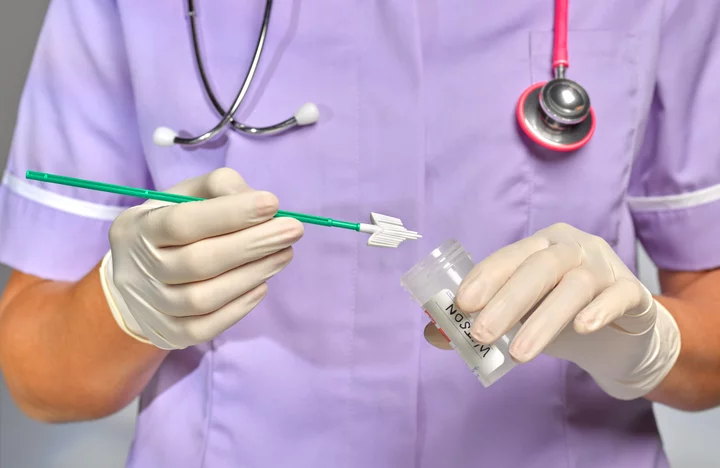You went to the doctor, got swabbed, and then you see the results: You have an STI (sexually transmitted infection). You're one of the millions of cases in the U.S. or elsewhere a year, so you're far from alone, but it still can feel scary to test positive. Mashable spoke to a sex and relationship expert about what to do if you get an STI.
How often should I get tested for STIs?
This depends on your lifestyle. If you're in a long-term, monogamous relationship — and it's staying that way — then maybe there's no need for you to be tested. If you're just entering a relationship, however, both of you should get tested before having unprotected sex.
SEE ALSO: https://mashable.com/article/oral-chlamydia-explainedIf you have multiple partners and especially if you have unprotected sex with them (without condoms or dental dams), then you should be tested more often. Depending on how many partners and how often you have sex unprotected, test anywhere from every four weeks to two months. And don't worry, you can take an STI test during your period.
It's also possible for you and your partner to have different STI results. This doesn't mean someone cheated; everyone's body and immune systems are different.
While some STI symptoms appear days or weeks after exposure, others don't show up until long after — and in some cases, STIs are asymptomatic. This is why it's imperative to get repeated screens.
Where should I get tested for STIs?
This also depends — on where you live and your health insurance. Unfortunately, these tests can run for thousands of dollars without insurance, but check if there's a sexual health clinic in your area that would test you for free.
Zachary Zane, sex and relationship expert for Archer, a dating app for queer men, and author of Boyslut: A Memoir and Manifesto, told Mashable that sexual health clinics could be more beneficial than say, an urgent care facility, because they're more equipped for STI testing. In addition to blood and urine testing, sexual health clinics may swab your mouth and genitals, which a standard urgent care may not be able to do.
An alternative is at-home STI tests, but your best bet is to be tested by a professional.
What should I do if I get an STI?
Firstly, don't freak out, said Zane. According to the CDC, there are millions of STI cases per year, meaning many others are in your position.
STIs are stigmatized and associated with being "dirty," so even if someone has one, they may not be public about it. The reality is that STIs are a part of life. Unless you knowingly had unprotected sex with an STI, you didn't do anything wrong. Further, some STIs can be spread through skin-to-skin contact, like syphilis and genital warts, so you aren't completely protected by condoms. This means sex — protected or not — involves risk, and getting an STI happens.
Get treated immediately for an STI, especially if it's bacterial like chlamydia, gonorrhea, and syphilis, and requires antibiotics to heal. Note that you can't just take any antibiotics to treat STIs — you need the specific ones that target whatever infection you have.
Leaving an STI untreated can result in serious side effects later on. For example, untreated gonorrhea or chlamydia can cause pelvic inflammatory disease in women, the CDC notes, or a painful condition in tubes attached to testicles.
Don't have sex again until you've completed treatment. Wait seven days after finishing the medication (or however long your doctor tells you) and make sure your symptoms are gone before being intimate again.
How do I tell my partner I got an STI?
Perhaps the hardest part is telling your partners because of STI stigma. If someone lashes out, know that's based on their fears — and STIs are feared in our society due to engineered stigma.
"The stigma surrounding STIs is designed," Zane wrote in Boyslut. "It's designed to keep you from having sex. It's designed to make you feel shame for something normal and healthy."
Despite the fear, be honest and let every partner you've had since your previous STI-free testing know that you tested positive. Zane offered a simple script for a text (no need to call them or meet them in person, unless you're really jonesing to): "Hey, I want to give you a heads up that I tested positive for [insert specific STI] so you can get tested and treated if necessary."
Want more sex and dating stories in your inbox? Sign up for Mashable's new weekly After Dark newsletter.
Don't just say "an STI," because different STIs require different treatments. Also, you don't need to go on an apology streak about how sorry and horrible you are. Again, if you didn't willingly pass an STI, you didn't do anything wrong.
STI shame has been used throughout history to perpetuate xenophobia, racism, and homophobia. Zane points to syphilis as an example. A 2014 paper on a brief history of syphilis in the Journal of Medicine and Life states, "Each country whose population was affected by the infection blamed the neighboring (and sometimes enemy) countries for the outbreak." People who live in what's now Italy, UK, and Germany called it the "French disease," while French people called it "the Neapolitan disease," and so on.
A more modern example is the AIDS epidemic. In the early days of AIDS, it was called "gay cancer" or the "gay plague," and homophobic people used the disease to justify their hatred. Ronald Reagan's press secretary even joked about it.
"When you shame someone for getting an STI, you're engaging in a lot of other shaming," Zane continued in Boyslut.
You don't need to feel ashamed for contrasting an STI. You do need to get treated, tell your partners, and keep getting tested in the future.









